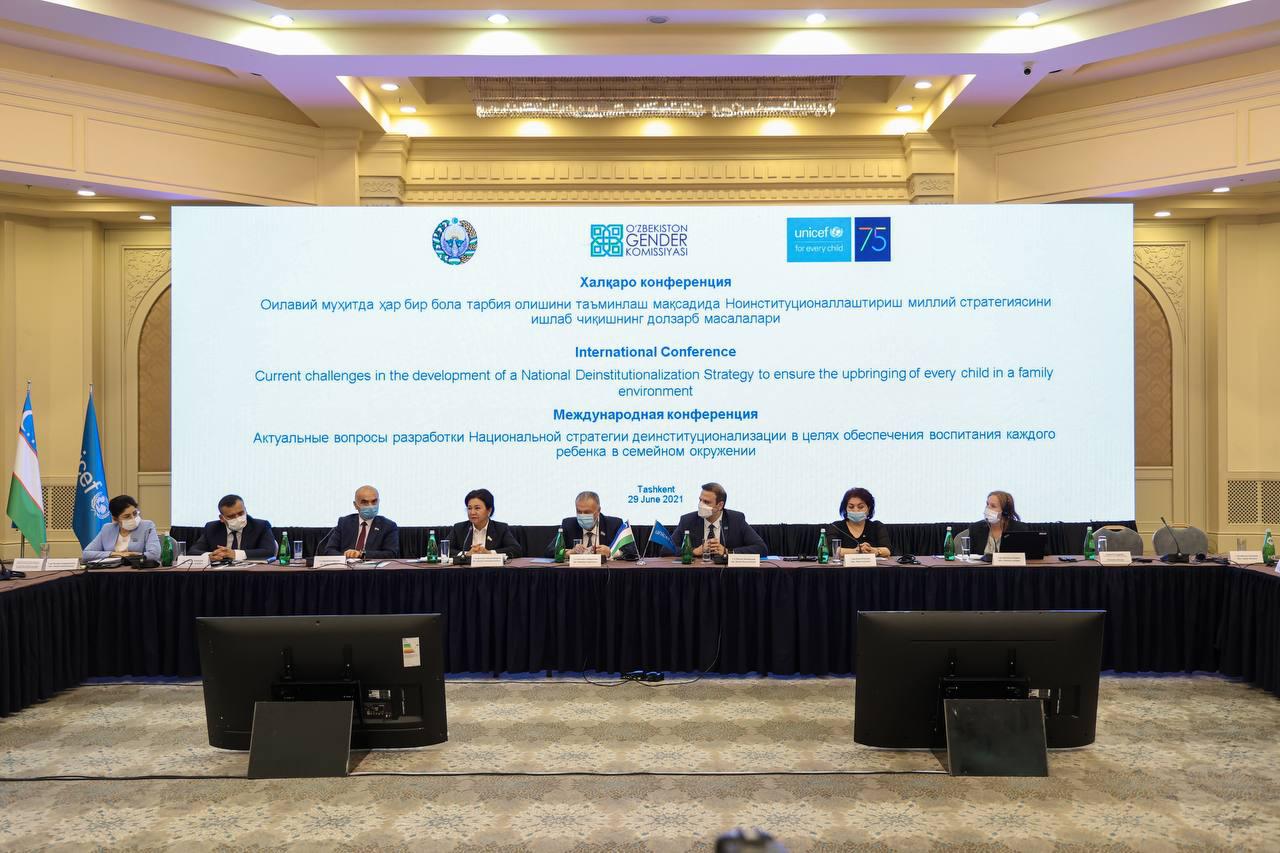Phones in Tashkent:
On December 2, 2024, SOS Children's Villages Uzbekistan and the Commissioner for Children's Rights of the Oliy Majlis of the Republic of...
SOS Children’s Villages Uzbekistan warmly welcomes the adoption of the new Law of the Republic of Uzbekistan "On the Protection of Children...
On July 31, 2024, students of Seoul National University of Social Welfare, professor of the medical department and professor of humanities, and...
Currently, SOS Children's Villages Uzbekistan established an active cooperation with the National Agency for Social Protection, and branches of...

“Every child has every right to grow up in a family environment, to feel the love of parents, the attention and care of relatives,” noted Tanzila Narbaeva, Chairperson of the Senate of the Oliy Majlis, Chairperson of the Board of the SOS Children's Villages Uzbekistan.
On June 29th, the SOS Children's Villages Uzbekistan took part in an international conference on the topic "Current challenges in the development of a National De-institutionalization Strategy to ensure the upbringing of every child in a family environment."
The Director of the SOS Children’s Villages Uzbekistan, Gulnoza Abidova, presented her report on the development of services aimed at providing comprehensive support to young people over 18 years of age leaving alternative forms of care, that contribute to secondary prevention and ensure the sustainability of results achieved in childhood and, consequently, investments made by the state.
SOS Children's Villages International has been providing a full range of services for several decades in many countries, including the Republic of Uzbekistan, consisting of:
Long-term experience shows that the development of youth support programs, at first glance, is not a priority in the de-institutionalization processes, however, it is very important not only to ensure the sustainability of investments made in children in the intermediate period in the long term but also as a preventive measure of social vulnerability of population and children. According to our data, every year more than 200 children over 18 years old leave child care institutions in Uzbekistan, which is when, formally, all types of support and guardianship for them are terminated. Undoubtedly, the state is progressing in providing housing and providing benefits for admission to universities; however, support for young people is limited to fragmentary issues, respectively, and comprehensive support for young people is relevant.
Youth leaving care support programs aim at an effective and less painful transition of young people to an independent life, for both children and society, which is critical for the sustainability of the results achieved in childhood and, therefore, the investments made by the state. This is especially true for children and young people who have grown up under guardianship. Supporting the transition of young people to an independent life is a complex task, SOS Children's Villages adheres to five basic guiding principles, following which will ensure the best care for young people:
Share

“Every child has every right to grow up in a family environment, to feel the love of parents, the attention and care of relatives,” noted Tanzila Narbaeva, Chairperson of the Senate of the Oliy Majlis, Chairperson of the Board of the SOS Children's Villages Uzbekistan.
On June 29th, the SOS Children's Villages Uzbekistan took part in an international conference on the topic "Current challenges in the development of a National De-institutionalization Strategy to ensure the upbringing of every child in a family environment."
The Director of the SOS Children’s Villages Uzbekistan, Gulnoza Abidova, presented her report on the development of services aimed at providing comprehensive support to young people over 18 years of age leaving alternative forms of care, that contribute to secondary prevention and ensure the sustainability of results achieved in childhood and, consequently, investments made by the state.
SOS Children's Villages International has been providing a full range of services for several decades in many countries, including the Republic of Uzbekistan, consisting of:
Long-term experience shows that the development of youth support programs, at first glance, is not a priority in the de-institutionalization processes, however, it is very important not only to ensure the sustainability of investments made in children in the intermediate period in the long term but also as a preventive measure of social vulnerability of population and children. According to our data, every year more than 200 children over 18 years old leave child care institutions in Uzbekistan, which is when, formally, all types of support and guardianship for them are terminated. Undoubtedly, the state is progressing in providing housing and providing benefits for admission to universities; however, support for young people is limited to fragmentary issues, respectively, and comprehensive support for young people is relevant.
Youth leaving care support programs aim at an effective and less painful transition of young people to an independent life, for both children and society, which is critical for the sustainability of the results achieved in childhood and, therefore, the investments made by the state. This is especially true for children and young people who have grown up under guardianship. Supporting the transition of young people to an independent life is a complex task, SOS Children's Villages adheres to five basic guiding principles, following which will ensure the best care for young people:
Share
On December 2, 2024, SOS Children's Villages Uzbekistan and the Commissioner for Children's Rights of the Oliy Majlis of the Republic of...
SOS Children’s Villages Uzbekistan warmly welcomes the adoption of the new Law of the Republic of Uzbekistan "On the Protection of Children...
On July 31, 2024, students of Seoul National University of Social Welfare, professor of the medical department and professor of humanities, and...
Currently, SOS Children's Villages Uzbekistan established an active cooperation with the National Agency for Social Protection, and branches of...